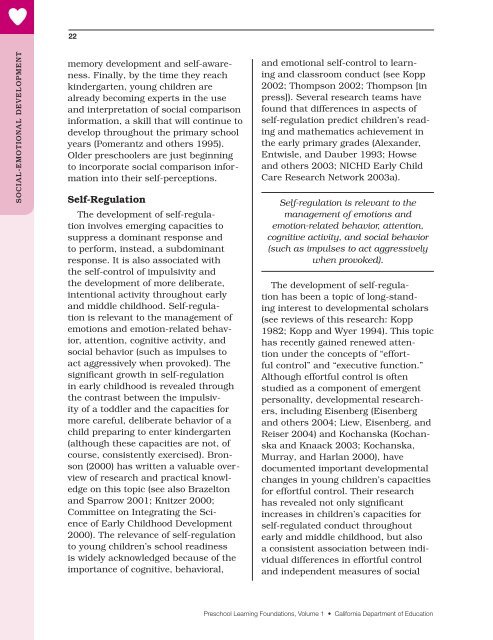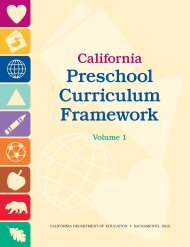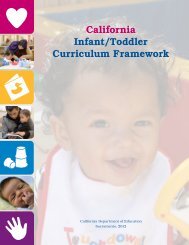California Preschool Learning Foundations - ECEZero2Three ...
California Preschool Learning Foundations - ECEZero2Three ...
California Preschool Learning Foundations - ECEZero2Three ...
You also want an ePaper? Increase the reach of your titles
YUMPU automatically turns print PDFs into web optimized ePapers that Google loves.
SOCIAL-EMOTIONAL DEVELOPMENT<br />
22<br />
memory development and self-awareness.<br />
Finally, by the time they reach<br />
kindergarten, young children are<br />
already becoming experts in the use<br />
and interpretation of social comparison<br />
information, a skill that will continue to<br />
develop throughout the primary school<br />
years (Pomerantz and others 1995).<br />
Older preschoolers are just beginning<br />
to incorporate social comparison information<br />
into their self-perceptions.<br />
Self-Regulation<br />
The development of self-regulation<br />
involves emerging capacities to<br />
suppress a dominant response and<br />
to perform, instead, a subdominant<br />
response. It is also associated with<br />
the self-control of impulsivity and<br />
the development of more deliberate,<br />
intentional activity throughout early<br />
and middle childhood. Self-regulation<br />
is relevant to the management of<br />
emotions and emotion-related behavior,<br />
attention, cognitive activity, and<br />
social behavior (such as impulses to<br />
act aggressively when provoked). The<br />
significant growth in self-regulation<br />
in early childhood is revealed through<br />
the contrast between the impulsivity<br />
of a toddler and the capacities for<br />
more careful, deliberate behavior of a<br />
child preparing to enter kindergarten<br />
(although these capacities are not, of<br />
course, consistently exercised). Bronson<br />
(2000) has written a valuable overview<br />
of research and practical knowledge<br />
on this topic (see also Brazelton<br />
and Sparrow 2001; Knitzer 2000;<br />
Committee on Integrating the Science<br />
of Early Childhood Development<br />
2000). The relevance of self-regulation<br />
to young children’s school readiness<br />
is widely acknowledged because of the<br />
importance of cognitive, behavioral,<br />
and emotional self-control to learning<br />
and classroom conduct (see Kopp<br />
2002; Thompson 2002; Thompson [in<br />
press]). Several research teams have<br />
found that differences in aspects of<br />
self-regulation predict children’s reading<br />
and mathematics achievement in<br />
the early primary grades (Alexander,<br />
Entwisle, and Dauber 1993; Howse<br />
and others 2003; NICHD Early Child<br />
Care Research Network 2003a).<br />
Self-regulation is relevant to the<br />
management of emotions and<br />
emotion-related behavior, attention,<br />
cognitive activity, and social behavior<br />
(such as impulses to act aggressively<br />
when provoked).<br />
The development of self-regulation<br />
has been a topic of long-standing<br />
interest to developmental scholars<br />
(see reviews of this research: Kopp<br />
1982; Kopp and Wyer 1994). This topic<br />
has recently gained renewed attention<br />
under the concepts of “effortful<br />
control” and “executive function.”<br />
Although effortful control is often<br />
studied as a component of emergent<br />
personality, developmental researchers,<br />
including Eisenberg (Eisenberg<br />
and others 2004; Liew, Eisenberg, and<br />
Reiser 2004) and Kochanska (Kochanska<br />
and Knaack 2003; Kochanska,<br />
Murray, and Harlan 2000), have<br />
documented important developmental<br />
changes in young children’s capacities<br />
for effortful control. Their research<br />
has revealed not only significant<br />
increases in children’s capacities for<br />
self-regulated conduct throughout<br />
early and middle childhood, but also<br />
a consistent association between individual<br />
differences in effortful control<br />
and independent measures of social<br />
<strong>Preschool</strong> <strong>Learning</strong> <strong>Foundations</strong>, Volume 1 • <strong>California</strong> Department of Education
















